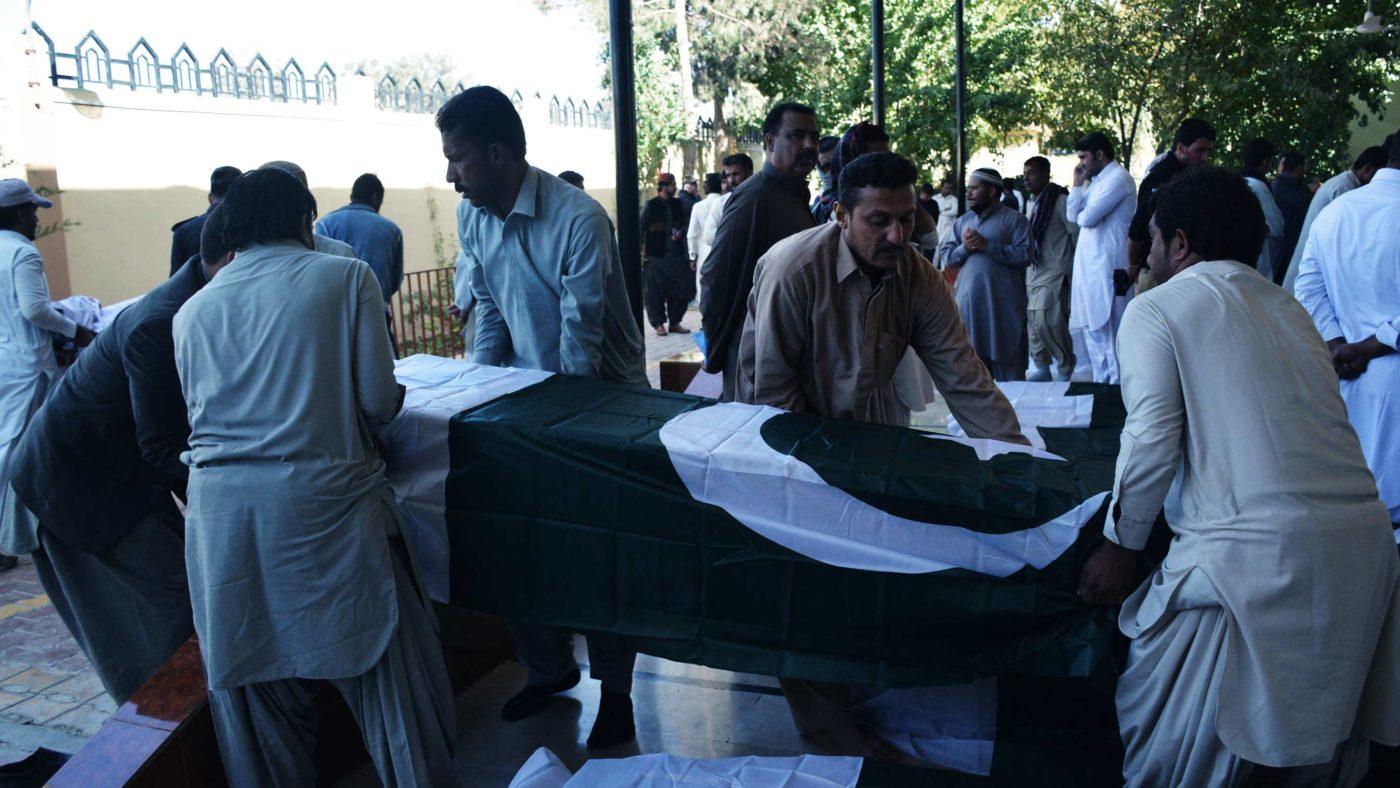Islamic State have claimed their second major suicide attack in Pakistan in the space of three months. In the early hours of the morning, 60 police cadets in the western city of Quetta, the capital of Blaochistan province, were killed as they slept. Three suicide bombers had made their way into the barracks, gunning down the cadets before blowing themselves up upon the arrival of Pakistan’s security forces.
Normally, the Islamic State’s claims of responsibility for such attacks should be taken with a large pinch of salt. Quetta is hundreds of miles from its only current base in the region, in Nangahar province on the Afghan side of the Khyber Pass.
Yet the propaganda for this attack suggests this claim at least may be accurate. The jihadis’ main news network, Amaq, posted a staged photograph of the three attackers before they embarked on their suicide mission. Subsequent photos of one of the attackers’ corpses, gruesomely available on Twitter, indicate that it was the same people in the earlier photograph. Given the vying for supremacy on Pakistan’s crowded jihadist scene, it is unlikely that anyone but Islamic State militants would have handed the photograph to Amaq.
All of which raises the question of what can be done to stop Islamic State increasing its presence in Pakistan, even as it loses ground in Syria and Iraq?
This is not a question, as it happens, that the Pakistani government would like us to be asking. It has settled on a familiar scapegoat for this attack: Lhaskar e Jhangvi, a sectarian Sunni group that has historically attacked soft Shia targets in Quetta, including this same police academy twice.
But what if Islamic State and Lashkar e Jhangvi have teamed up? In June this year, Pakistani police announced that three Islamic State militants, together with a large amount of explosive material, had been arrested in Lahore. At the time they noted that Islamic State was looking at furthering ties with Lhashkar e Jhangvi.
Lashkar e Jhangvi is short of a leader, after the group’s head , Malik Ishaq, was killed by police in July last year. Quetta, with its large population of Shia Muslims and Balochistan’s history of separatism from the Pakistani state, has long been one of its favourite targets. Islamic State’s two recent attacks on the same city, given all the other targets in Pakistan and the distance from their known safe area, suggest they are most probably making use of Lhashkar e Jhangvi’s old networks and skills.
This would also explain why Pakistani authorities were able to release transcripts of the militants receiving instructions from their known Lhashkar e Jhangvi sources.
Put in crude corporate terms, it is becoming apparent that Islamic State have effectively done a reverse takeover of Lhashkar e Jhangvi to establish more of a foothold in a new market.
What this means for Pakistan, however, is unclear. The country is no stranger to terrorist insurgencies: in recent years the Pakistani Taliban claimed much of northern Pakistan up to the capital Islamabad, while the tribal border areas have been the safe house of jihadi groups since before 9/11. How the Islamic State in Khorasan (to give it its official title) fits into this landscape remains to be seen – especially since it lacks the ties to Pakistan’s “deep state” that many other militant groups have historically relied on.
It also raises the prospect of another confrontation. Previously, Islamic State has made its presence felt in north Africa and the Middle East by vacating the ground left behind by al-Qaeda after bin Laden’s death. However, one place al-Qaeda still remains strong is in Afghanistan and Pakistan, where the group’s leader Ayman al-Zawahiwi still remains at large.
The Afghan Taliban, who are again on the ascendancy, having recently taken over large areas in southern (and now northern) Afghanistan, are also fiercely opposed to Islamic State, having fought battles with the group in Nangahar province.
Yet Islamic State has faced similar odds asserting itself against the more established jihadis in Syria and Libya and still succeeded.
Beating back decades of militancy and tribal loyalties in Afghanistan and Pakistan may be a more difficult prospect – but as Islamic State is pressed in Syria and Iraq, it is inevitable that it will seek to carve out a niche in a new area.
Let’s hope its enemies are more effective this time at nipping it in the bud.


